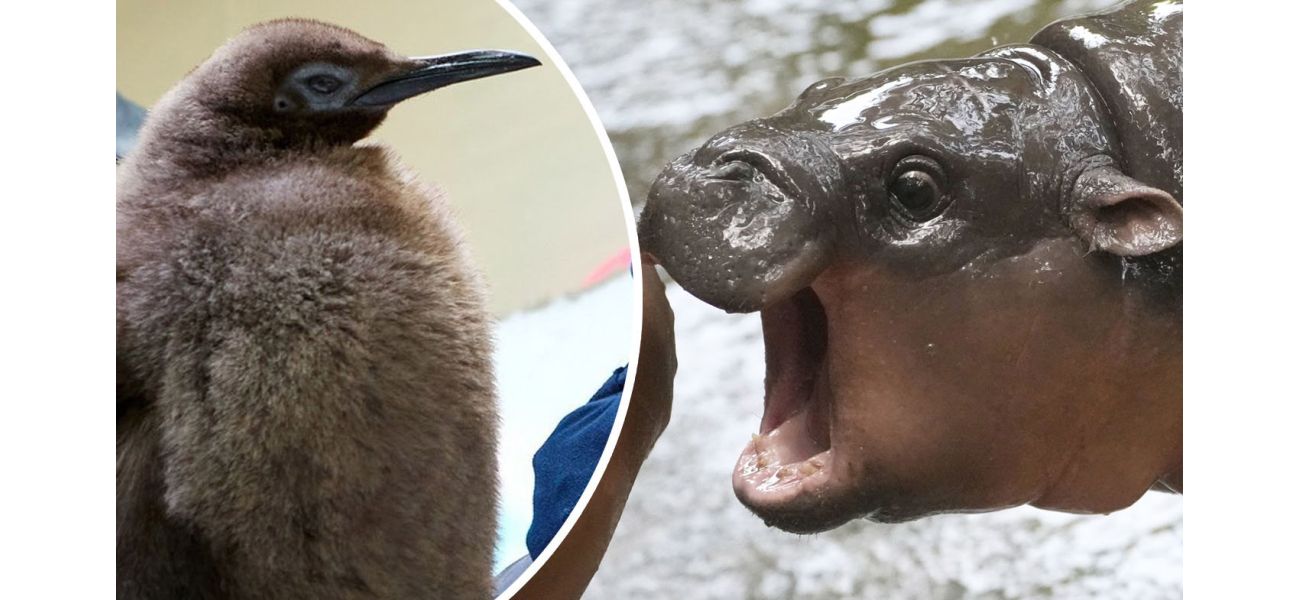Can animals like Moo Deng and Pesto spark conservation action?
In 2024, Pesto the Penguin became a beloved TikTok trend, capturing our hearts with its cuteness and large size.
December 30th 2024.

In the year 2024, there was a heartwarming trend on the popular social media platform, TikTok. It involved a lovable and unusually large penguin named Pesto who captured the hearts of many. Pesto was born at Sea Life Melbourne and was just like any other healthy penguin chick, but as he grew, he didn't seem to stop. By the time he was six months old, he was already bigger than both of his parents, Hudson and Tango. And at nine months old, he weighed over 20kg, which was more than both of his parents combined.
Pesto's story quickly gained attention and he now has over 1.9 billion followers on TikTok. In fact, he has become so popular that if you search for "pesto" on the app, the first result is the penguin, not the sauce. But Pesto wasn't the only animal to go viral that year. A playful pygmy hippopotamus named Moo Deng from Thailand's Khao Kheow Open Zoo also gained a lot of attention.
Moo Deng's adorable antics made her an instant online sensation, and Pesto and Moo Deng were not the first animals to become social media stars. We all remember the lovable Doug the Pug and the grumpy Grumpy Cat, but those animals were domesticated pets. Pesto and Moo Deng, on the other hand, were wild animals, even though they were living in captivity.
Their fame had a positive impact on the zoos where they lived. Both Khao Kheow and Sea Life Melbourne reported an increase in visitors who came to see the famous animals. Michaela Smale, a senior keeper at Sea Life Melbourne, shared that they have seen more social media and web traffic, as well as an increase in foot traffic. Pesto had become a must-see attraction for people visiting Melbourne, along with the city's famous shows, music, and coffee.
However, with fame comes concerns and controversies. Moo Deng's popularity led to the zoo having to limit visitors to five-minute viewings and put up signs asking people not to throw things at her. Some social media users expressed concern about the hippo's well-being and whether she was being mistreated or provoked for online attention. Animal rights group PETA also spoke out about Moo Deng's quality of life and called on zoos to prioritize conservation efforts that protect animals in their natural habitats.
On the other hand, the zoo insists that Moo Deng receives top-notch care. Conservation scientist Professor James Watson from the University of Queensland shared that zoos play a vital role in exposing people, especially children, to wildlife. However, he also mentioned that trying to humanize wild animals for the purpose of entertainment may not be the best approach.
According to Professor Watson, caging any wild animal goes against their natural instincts and desires. But he also recognizes the importance of zoos in promoting nature conservation and educating people about wildlife. It's a delicate balance between preserving biodiversity, ensuring species' survival, and taking into account the individual animals' well-being. This is a common dilemma in the conservation world, and it puts the spotlight on the conflict between the animal welfare movement and the conservation movement.
Ultimately, Professor Watson emphasized the importance of experiencing and appreciating nature in order to truly care about its conservation. While zoos have played a significant role in this, he also acknowledged that with technology, we now have other ways of connecting with and learning about wild animals. He encouraged people to question zookeepers about their reasons for keeping animals in captivity, especially if it's solely for entertainment purposes. The power to make informed decisions lies in our hands.
Pesto's story quickly gained attention and he now has over 1.9 billion followers on TikTok. In fact, he has become so popular that if you search for "pesto" on the app, the first result is the penguin, not the sauce. But Pesto wasn't the only animal to go viral that year. A playful pygmy hippopotamus named Moo Deng from Thailand's Khao Kheow Open Zoo also gained a lot of attention.
Moo Deng's adorable antics made her an instant online sensation, and Pesto and Moo Deng were not the first animals to become social media stars. We all remember the lovable Doug the Pug and the grumpy Grumpy Cat, but those animals were domesticated pets. Pesto and Moo Deng, on the other hand, were wild animals, even though they were living in captivity.
Their fame had a positive impact on the zoos where they lived. Both Khao Kheow and Sea Life Melbourne reported an increase in visitors who came to see the famous animals. Michaela Smale, a senior keeper at Sea Life Melbourne, shared that they have seen more social media and web traffic, as well as an increase in foot traffic. Pesto had become a must-see attraction for people visiting Melbourne, along with the city's famous shows, music, and coffee.
However, with fame comes concerns and controversies. Moo Deng's popularity led to the zoo having to limit visitors to five-minute viewings and put up signs asking people not to throw things at her. Some social media users expressed concern about the hippo's well-being and whether she was being mistreated or provoked for online attention. Animal rights group PETA also spoke out about Moo Deng's quality of life and called on zoos to prioritize conservation efforts that protect animals in their natural habitats.
On the other hand, the zoo insists that Moo Deng receives top-notch care. Conservation scientist Professor James Watson from the University of Queensland shared that zoos play a vital role in exposing people, especially children, to wildlife. However, he also mentioned that trying to humanize wild animals for the purpose of entertainment may not be the best approach.
According to Professor Watson, caging any wild animal goes against their natural instincts and desires. But he also recognizes the importance of zoos in promoting nature conservation and educating people about wildlife. It's a delicate balance between preserving biodiversity, ensuring species' survival, and taking into account the individual animals' well-being. This is a common dilemma in the conservation world, and it puts the spotlight on the conflict between the animal welfare movement and the conservation movement.
Ultimately, Professor Watson emphasized the importance of experiencing and appreciating nature in order to truly care about its conservation. While zoos have played a significant role in this, he also acknowledged that with technology, we now have other ways of connecting with and learning about wild animals. He encouraged people to question zookeepers about their reasons for keeping animals in captivity, especially if it's solely for entertainment purposes. The power to make informed decisions lies in our hands.
[This article has been trending online recently and has been generated with AI. Your feed is customized.]
[Generative AI is experimental.]
0
0
Submit Comment





